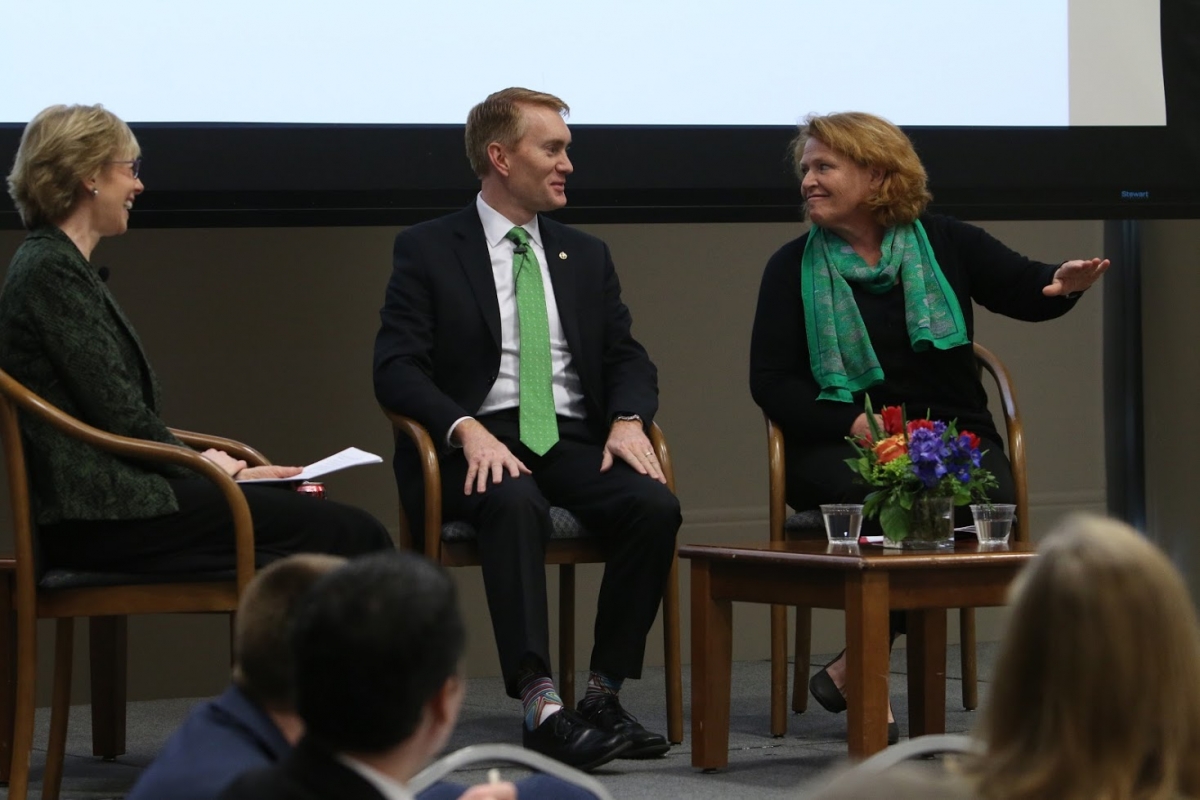Sydney E. Allen
This article originally appeared on March 21, 2016 in GW Today.
While most of GW was quiet Thursday in the last days of spring break, two U.S. senators were addressing a crowd of more than 300 at the Society for Benefit-Cost Analysis 8th Annual Conference at the University Student Center.
Sen. James Lankford (R-Okla.) and Sen. Heidi Heitkamp (D-N.D.) serve as chairman and ranking member, respectively, of the Senate Subcommittee on Regulatory Affairs and Federal Management (RAFM). As leaders of the subcommittee, they have co-sponsored a number of bipartisan bills aimed at updating the current federal regulatory system and making the rulemaking process more evidence based.
The discussion was moderated by Susan Dudley, director of the GW Regulatory Studies Center and distinguished professor of practice in the Trachtenberg School of Public Policy and Public Administration. Prof. Dudley serves as president of SBCA.
"Our guests have risen above rancorous partisanship and through their leadership together have moved legislation aimed at improving measurement and analysis of regulatory impacts," said Prof. Dudley in her introduction.
In the senators’ remarks, made in a conversation-style format with questions posed by Prof. Dudley, they discussed their efforts to improve regulatory policy and what drives them in their leadership roles in the RAFM subcommittee.

"I came to this committee with the idea that the system that we currently have needs to be looked at," said Sen. Heitkamp. "People in communities throughout the country are looking at some of these regulations saying, ‘What were they thinking? Why are we doing this and how can we fix these problems? How can we change these outcomes?’"
The senators paid tribute to the academics and public policy experts in the audience, who, they said, had their finger more on the pulse of the very complex and technical issues in the regulatory system than the senators did themselves.
"The work that you do is absolutely invaluable. I’m amazed at the amount of people that will come up to me or to other senators and say, ‘Didn’t you know this, this and this?’ As strange as it may sound, members of Congress are not omniscient, and that’s shocking," Sen. Lankford joked as the audience laughed.
"The hardest thing to get in this town is the real number—the hardest thing—because everyone has a different baseline, everyone has a different direction. At the end of the day, we’re accountable with the real number. And so, I just want to tell you that we appreciate what you do very much because you’re trying to drive towards getting to the real number."
And how do Sens. Lankford and Heitkamp balance politics and governing in an ever-divisive political atmosphere?
"If you start from the assumption that your political party will always have the White House, and whatever your political party’s agencies do is right, we will fail because politics change," said Sen. Heitkamp. "The view that we’re taking on all of these issues is not a partisan view, it’s a process view."
"We have to get the pressure valve back on Congress to actually say, "Nothing is going to get done unless you guys actually get together and work this out,’" said Sen. Lankford. "Common ground is tough to find—in this town, it really is."
Sens. Lankford and Heitkamp’s address served as the keynote for the SBCA’s 8th Annual Conference. This year’s event was the third hosted by GW and drew scholars and practitioners from government, academia, nonprofit organizations and private industry around the world.
Both the Trachtenberg School of Public Policy and Public Administration and the GW Regulatory Studies Center are longtime patrons of SBCA, which was founded at the University of Washington Evans School of Public Policy and Governance with support from the MacArthur Foundation. The American Chemistry Council sponsored the lunch event on Thursday. The three-day event included a day of pre-conference professional development workshops covering various topics in benefit-cost analysis and two days of the conference. Nearly 20 GW faculty, staff and students participated in the conference as panel chairs, presenters and volunteers.

